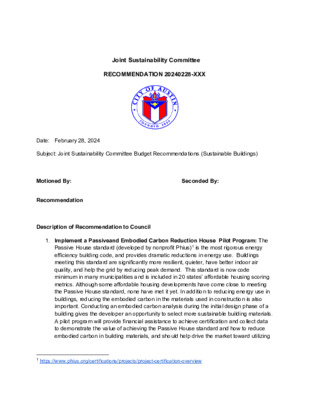2024-02-28 JSC Sustainable Buildings Budget Recommendations — original pdf
Backup

Joint Sustainability Committee RECOMMENDATION 20240228-XXX Subject: Joint Sustainability Committee Budget Recommendations (Sustainable Buildings) Motioned By: Seconded By: Date: February 28, 2024 Recommendation Description of Recommendation to Council 1. Implement a Passiveand Embodied Carbon Reduction House Pilot Program: The Passive House standard (developed by nonprofit Phius)1 is the most rigorous energy efficiency building code, and provides dramatic reductions in energy use. Buildings meeting this standard are significantly more resilient, quieter, have better indoor air quality, and help the grid by reducing peak demand. This standard is now code minimum in many municipalities and is included in 20 states’ affordable housing scoring metrics. Although some affordable housing developments have come close to meeting the Passive House standard, none have met it yet. In addition to reducing energy use in buildings, reducing the embodied carbon in the materials used in construction is also important. Conducting an embodied carbon analysis during the initial design phase of a building gives the developer an opportunity to select more sustainable building materials. A pilot program will provide financial assistance to achieve certification and collect data to demonstrate the value of achieving the Passive House standard and how to reduce embodied carbon in building materials, and should help drive the market toward utilizing 1 https://www.phius.org/certifications/projects/project-certification-overview Passive House more broadly. The Energy Efficiency Programs fee2 that all customers pay as part of their Austin Energy bills is intended to fund energy efficiency programs, such as this. A local Passive House incentive would help affordable housing developers maximize utilization of the Inflation Reduction Act 45L tax credit because projects certifying with Passive House also receive Zero Energy Ready Home certification and get $5,000 per unit in tax credits. The Joint Sustainability Committee recommends that: a. $2 million be allocated from the Energy Efficiency Programs fund for an Affordable Housing Passive House and Embodied Carbon Reduction Pilot Program to provide incentives to income-restricted affordable housing. Affordable housing projects that certify with Phius and conduct an embodied carbon analysis should be eligible for rebates, paid in three milestone payments during design (for hiring a consultant and committing to certification), construction (for precertification), and completion (for final certification). Projects should be required to share construction cost data, both hard and soft, and post-occupancy energy usage data. b. The Austin Energy Green Building department should be allocated 1 additional FTE or temporary position to develop and administer the program, in close consultation with stakeholders. 2. Sustainable Construction Procurement Coordinator: The City of Austin has multiple departments that issue requests for proposals (RFPs) for building and other construction projects and purchase construction materials, including concrete. There is currently a lack of consistent emphasis on sustainable construction materials and practices. There is also a need for additional coordination and leadership to implement low-carbon concrete standards for City of Austin projects to reduce emissions as quickly as possible. The Joint Sustainability Committee recommends that: A new full time Sustainable Construction Procurement Coordinator position be added within the Office of Sustainability to review RFPs and purchasing requests for construction materials and lead the coordination and development of a robust Low Carbon Concrete Plan that will reduce emissions in a timely manner. If a full-time position isn’t granted, a temporary position should be added, although this will be an ongoing need, so a permanent position will serve the city best. 3. Climate Equity Plan Program Coordinators: The Austin Climate Equity Plan contains ambitious greenhouse gas reduction goals and strategies to achieve those goals that touch every City department. Fully implementing the plan will reap great benefits to the City of Austin and its residents. The Office of Sustainability is not adequately staffed to facilitate full implementation of the plan. Additional staff are needed to spearhead this work and make the vision of the plan a reality. The Joint Sustainability Committee recommends that: five (5) new program coordinators be added to the Office of Sustainability - one to coordinate efforts on each section of the Climate Equity Plan. If a full-time positions aren’t granted, temporary positions should be added, 2 https://austinenergy.com/rates/residential-rates/other-line-items-on-your-bill although this will be an ongoing need, so permanent positions will serve the city best.